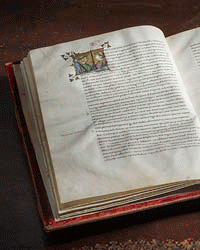Rare Book Monthly
New LetterLetters to the Editor
David Holloway December 08, 2003
I found the article on book prices very interesting and only a little alarming. I think that it is about a year behind the curve actually. It lacks an important qualifier, or perhaps this wasn't stated clearly enough in the article. If you are buying the cheapest copy, make sure you really are buying the copy you want. Many times the cheapest copy is a reprint that is misdescribed as a first, or a rebound copy with no notice of rebinding, or a copy that someone inexperienced regards as 'good for it's age'.....I have heard from many book collector's who bought the cheapest copy and then were stuck with the problem of returning an inferior copy. Two expressions come to mind... 'buy cheap/ buy twice' and 'the cheapest man pays the most'. As we enter the age where everyone is a bookseller the ability to recognize what you are selling is not without value.
David Holloway
Virginia
Susan Alon December 03, 2003
I've never been a bookseller, but I have been in other businesses and seen what happens in changing times. re. previous email I have an open shop in a small town, with 4,500 priced, I hope wisely, titles. If I feel a book is worth what I ask, just because there are several other copies for less, my book comes with my experience, and if Stillman doesn't understand what that means as an antiquarian, that is why he is writing these kind kind of articles. Let's discuss..
Susan Alon MA, MFA, MLS
Miriam Green Antiquarian
Clinton CONN
Writer's Response
Susan,
I think you somewhat misunderstand my point. I am in no way disparaging the contributions made by knowledgable booksellers nor questioning their value. I am simply making an observation on what are clearly changing times, what I believe the future will bring, and how that prediction, if it comes to pass, will affect booksellers. And while I admit that I am not nor have ever been a bookseller, and do not begin to possess the knowledge of antiquarian books that you have, I do have one credential that I believe makes my opinions at least worthy of consideration by those in the trade. I am a consumer.
My point is not that your skills aren't important and valuable. It is simply this: I have seen knowledge and experience brushed aside for lower prices time and again over the course of my life. It started with the helpful neighborhood grocer/butcher who was replaced by the supermarket. Then there was the local appliance shop where they could tell you all about the latest gadgets. We now buy them at Wal Mart where the help, if you can find them, know next to nothing. In the new book field, we have already seen the neighborhood shops replaced first by chain bookstores, then megastores like B&N and Borders, and finally Amazon.com. And while I truly appreciated the man at the service station who made sure my oil wasn't low, my tires properly inflated, and took care of the work, I still find myself pumping gas at a convenience store to save a nickel. We consumers, or at least most of us, have a nasty habit of going for the lowest price, even as we whine and moan about the lack of service. We like service, but we just aren't willing to pay for it. This is why it is my belief, and this is only my belief, that most successful booksellers in the future will have to first be able to compete on price. Only if their prices are competitive will they then be able to capture business based on level of service or other factors.
As I noted in my comment to Lee Kirk's letter, this only applies to titles for which at least several copies are being offered for sale. If you hold the only copy of an item currently for sale, competition won't control your price. You will, with the challenge then being to find someone who wants your book enough to pay your price.
c December 02, 2003
As I digested this writer's article (ed. note "The Price Is Wrong") becoming more apalled at each sentence
UNTIL I came to the crux,
I am not a bookseller but I have been in other businesses...
It is good thing, he would make an incompetent bookman.
This article should become a forum for why his analysis is flawed. Times
are a changing and we will sink like a stone.
The book business still remains unique among retail trades, as does
antiques and other objects of virtue.
Lee Kirk December 02, 2003
Mike Stillman's article, is interesting, but it contains one fallacy in
its argument on supply and demand. Comparing "scarce" books to loaves of bread simply does not work. The supply of scarce books (I'm not talking about modern shlock run off in hundreds of thousands of copies) is finite. Loaves of bread are easily and infinitely reproducible. Although the market may be glutted with moderately-scarce books right now - a phenomenon brought on by the ease of selling on the Internet - the supply is diminishing even as the population is increasing. And, although the demand has always been and will always be limited to a small segment of that population, the segment itself grows along with the general population. In other words, static number of copies available coupled with current increased marketing means the supply is diminishing even as the demand is increasing. It will take some time, but these books will once again become scarce and "worth" more as demand outstrips the supply.
Regards,
Lee Kirk
The Prints & The Paper
Writer's Response
Lee Kirk makes a very good point that prices are likely to rebound as either the number of collectors increases or more copies of individual titles are effectively removed from the market, such as by being placed in institutional collections. My point about lowered prices applies only to those cases where there are numerous copies available. In this case, I believe the visibility of those copies on the internet will drive prices down. But, this does not apply where copies are truly scarce. The internet is not going to make a copy of the Declaration of Independence any cheaper.
Ultimately, as copies become very scarce, the internet may enable booksellers to charge more for the very rare titles, and for the same reason. Just as it is now making copies for sale more visible today, it is also making buyers more visible. In other words, the bookseller with a very rare book in the past had only his own audience to sell it to. The internet now allows that dealer to offer that book to many more potential customers, which may allow for a higher price. At the moment, I think the balance favors the buyer in that books are being posted for sale at a more rapid rate than are people joining the field of collecting, but as supply decreases and the number of collectors increases, the balance will shift the other way.
Metamora May 03, 2003
Dear Abby,
While your piece on the New York Book Fair was fine in itself, it wasn't analysis. Gathering a few impressions and getting a couple of numbers doesn't do the job. Analysis suggests investigation into a subject, with data (not impressions) from several applicable sources.
Your title suggested that a study of internet marketing and commerce was going to be compared directly to current retail experience in the book fair environment. That was not what you offered. As a matter of fact, virtually no information on the current state in internet selling was given.
Keep up the good work of reporting, just be very careful about your titles and headlines.
Gail Ginther
wklimon May 02, 2003
Hello:
I am writing to point out to Mr. McKinney that January 1st is the Feast of the Circumcision of the Lord on the old Roman Catholic and Anglican liturgical calendars. That is undoubtedly the intended reference in his 1833 Poughkeepsie Almanac.
*The Oxford Companion to the Year*, ed. B. Blackburn and L. Holford-Stevens
(Oxford U. Pr. 1999) is a most useful reference for anyone dealing with old
almanacs, diaries, and date books. OCY contains several articles on different calendar systems, but the heart of the book is a day-by-day breakdown of the Western calendar tradition, with listings of holy days, saints' days, and holidays for each day of the year--along with other interesting facts and traditions for each day.
Keep up the good work, I love the site. When I get my house refinished and my books out of storage and my collection organized, I will be back as a subscriber.
Best regards.
William M. Klimon
william.m.klimon.c87@alumni.upenn.edu
Tim Johnson April 15, 2003
Dear Abby (seems like I've heard that salutation somewhere before),
At your invitation I read the article by Bruce McKinney in AE Monthly on book descriptions and offer this related question: who owns a book description created by a rare books cataloger employed by a research library (public or private)? Our general practice, it seems, is to spend vast amounts of money for an automated and integrated library system that allows highly trained and experienced catalogers to place original information (some of it possibly derived from dealers descriptions) onto a publicly accessible web site catalog for the use of students, staff, faculty, and the general public. If you use our online catalog, MNCAT, you find the following notice at the bottom of the screen: © 2002 by the Regents of the University of Minnesota. All rights reserved.
Please let us know if you have any comments or suggestions. Funded in part by the State of Minnesota as a component of MnLINK.
MNCAT® and LUMINA® registered with the U.S. Patent and Trademark Office.
Does this mean that our catalog is under copyright protection and that we will pursue those who infringe our rights? Will we be subject to the "check-box agreement" proposed by Mr. McKinney and need to provide credit within the body of our own bibliographic records? Should we be equally concerned with dealers who might cut and paste from our own freely available catalogs as they build their descriptions? Or do we do what we do (be it acquisition or cataloging) as an expression of the public good and our commitment to an informed citizenry, often with the help of private collectors and valued dealers? If Mr. McKinney wishes to give credit where credit is due, then it seems as if original catalogers, curators and even taxpayers merit a bit more praise and attention. That is where the true value, and the true good, is found.
Tim Johnson Curator, Special Collections & Rare Books
University of Minnesota Libraries
Sarina Wyant April 09, 2003
sarina wyant wrote:
Dear Ms. Tallmer:
I read the article "Book Descriptions:The Key to Reselling," by Bruce McKinney with great interest. The issue concerning the use of book descriptions as I see it is who owns the intellectual property, the "book
description." The logical and legal answer is the creator of the description or in the case of employees of the dealer firm, the firm itself.
When a person purchases something the person does not own the "ad" generated by the company to sell that item. A book is bought as such: a book. The written descriptions used to establish provenance, hence value, are not inherently part of that book as originally created and should not be implied as being part of the sale of a volume. Rules about citing descriptions to be used in resale should be standardized in the book trade but the transfer of ownership of the intellectual property should not be universally imposed upon sellers. That would not be fair. If the value of the book is enhanced by the seller's description and the new owner uses that description to make a profit selling the book then the creator of the description should receive a royalty resulting from the new sale. To protect the buyer's and seller's interests potential resale, an agreement between the individual seller and buyer, a legally binding contract in the sales agreement establishing use and transfer of ownership of the book descriptions is necessary but should
not be mandatory. The adage buyer (and seller) beware should apply.
Sincerely,
Prof. Sarina Wyant
Assistant Archivist and Special Collections
Librarian
University of Rhode Island Library
LoupGarouB April 09, 2003
Ms. Tallmer,
I've been in the book business since 1977 and have seen how technology has created new issues such as the ownership of book descriptions by the saturating nature of online communication. What is legal vs. what is common practice, however, are two different things. I am not a lawyer, but it seems that even if copyright protection is granted to the creator of the book descriptions, there is nothing in the way of damages incurred should the buyer down the line re-use the description to re-sell the book. (So the re-seller might be acting illegally, but is not likely to be sued.) And we are talking "book," as in a distinct copy, as opposed to a bookseller's description of a title of which s/he has many copies to sell, which puts the buyer of one or more copies in the position of being able to compete. (That's a different and arguable side, especially where booksellers are also publishers, in which case I would vote on the side of copyright protection where damages could be measured.) Or when book descriptions are appropriated by people with competing copies to sell. Or when a reseller marks up the price and creates a drop-ship situation without the original seller's knowledge, another issue altogether.
Those individual copies of collectible books that deserve provenance and enjoy historical importance have traditionally carried with them the descriptions bestowed by previous owners and sellers, as noted in your article. I believe the use of these descriptions should follow the book as it changes hands, although legally the seller should expressly acknowledge authorship and relinquish the copyright. I do not agree with McKinney's idea that credit be given to the creator of these descriptions, although legally this might be the laudable solution. (Should this creator's name have significance that will enhance the value or resalability of an item, a later marketer will broadcast the association loud and clear.) But that this becomes a standard or the lack of its practice a tarnish seems to me too much of a burden, and in some cases subject to abuse by those with similar copies.
What must be noted is that there are now more books on the market than ever before, but the number of individual volumes that deserve olde world attention to detail are drowned by an increasing percentage of proffered dross. Few volumes merit the work, and those that do will remain within that small circle of book collecting elite where tradition and high standards continue to dictate business practices, technology be damned.
I suspect that few of the online booksellers these days have ever handled books important enough to carry provenance. Their pique is raised when someone borrows their overview of the plot or theme, or a tidbit about the author inserted in a 200-word description of a mass-market book listed on ABE or Alibris, in order to sell another copy of the same book. This is a different issue altogether.
Interesting topic. Thank you for the opportunity to voice
an opinion.
Antoinette Graham
Loup Garou Books
P.O. Box 266
Micanopy, Florida 32667
U.S.A.
http://LoupGarouBooks.com
Selling fine books since 1977
DSloan April 09, 2003
Dear Abby,
I am an auctioneer, rare book dealer, and appraiser. I am never bothered when someone "steals" my descriptions. I suppose that I am secretly pleased that someone thought enough of my work to "steal" it.
In his introduction to Guide to the Life and
Literature of the Southwest (1942, 1952, etc.), J. Frank Dobie had printed on
the copyright page: "Not copyright. Anybody is welcome to help himself to any
of it in any way."
I agree with that generous idea. I learned a great deal from others, and if
my work can help anyone else, then I hope that they will feel free to use it. I can only speak for myself and my cataloguing,
but I do not consider my descriptions to be classified as a valuable or sacred commodity that must be protected.
Certainly, acknowledging and quoting another's work is the best and most
courteous way to proceed.
I like the concept of sharing knowledge and believe that it contributes to a more enlightened world.
Dorothy Sloan
RICHLER April 09, 2003
Following the interesting discussion on the
copyrights of book descriptions, I should like to pose another question on copyrights.
Suppose A owns a rare book or manuscript and gives a photocopy to a friend or scholar, perhaps with permission to publish, perhaps without.
A then sells the MS to B. Again, B may or may not be aware that the scholar has a copy.
The scholar decides to publish the text or to give the photocopies to another party.
Does B (the new owner) retain any copyright over the photocopies? Is the scholar free to publish or to give or sell the photocopies to another party or is he obligated to ask the new owner (B) permission to do so?
What if the manuscript is sold to an anonymous
purchaser?
The same question is valid when a library holds microfilm copies of manuscripts from another collection which is later sold.
Benjamin Richler
gsaretzk April 09, 2003
IMHO, a technical description (e.g. octavo, blue cloth, gravure reproductions, etc.) is rather different from a summary of the book's
intellectual content and biographical information about the author written by the bookseller. The former is a statement of fact like "the auto has four wheels." The latter is a creative production and should be protected by copyright but infringement is impractical to enforce unless one
bookseller takes another's book descriptions en masse.
gary saretzky
Saretzky Online: Photo Books
w.barrow April 09, 2003
It would seem to me that any written book
description that is substantial and creative enough becomes the intellectual property of its author and can only be transferred with that author's permission. Should the buyer in particular or the trade in general benefit from being able to pass along these descriptions to succeeding generations
of owners, then either the descriptions need to be purchased (or clearly included in the sale of the books), or the trade needs to designate some minimal level of description to suffice for the purposes of generating a chain of title, which would be passed along with ownership of the book. I suppose one could argue that any description that was originally published may be copied and included with the book, solely as background information, but not re-published for marketing purposes except within the rules of Fair Use. And, since a percentage of
any description may be useful to the original dealer/author if they subsequently obtain another copy, it makes sense for them to retain the ability to re-use their own prose.
WILLIAM C. BARROW
Special Collections Librarian
Cleveland State University Library
2121 Euclid Avenue
Cleveland, OH 44115
(216) 687-6998 (office)
(216) 687-2449 (Special Collections)
(216) 687-9328 (fax)
w.barrow@csuohio.edu
http://web.ulib.csuohio.edu/SpecColl/ (Special Collections)
Dillonbook April 09, 2003
atallmer@yahoo.com writes:
Whether collectors have the right, with attribution, to re-use these book descriptions when they in turn decide to sell their collections.
Of course they do not. In 1989, for example, Sotheby's sold The Collection of The Garden Ltd. The collection included two Alexander Pope manuscripts acquired from the Houghton sale, Christie's 1980.
When Sotheby's
manuscript-cataloguer turned in his work in 1989, I discovered that he had simply copied the Pope descriptions verbatim from
the Houghton catalogue -- reasoning, as I recall, that he had written them himself while working for Christie's nine years before. I told him, and Sotheby's general counsel told him, that we couldn't possibly print them like that.
The descriptions belonged to Christie's and Christie's alone. Not the seller, not the cataloguer, not the buyer, not successive buyers.
My own modest contributions to the genre, eg
Sidis
1926
(Onassis)
Lovat
1948
Lehrer
1954
Feynman 1987
can entail days of research, painstaking
correspondence, travel, shmoozing,
tenacity, enthusiasm, the occasional insight, and
sometimes even a fortunate
turn of phrase. My descriptions are not "work for
hire", nor do they become
"work for hire" retroactively when the underlying
goods are sold. (If that
were the case, then PepsiCo could buy a Coke and
then start using Coke's
advertising copy.)
My descriptions are my property. In most cases I
would be amazed if anyone
thought them worth reprinting; but nevertheless they
are my property. One
important collector asked me years ago whether he
might buy my descriptions
as he buys my books, and of course I told him yes;
yet there are other buyers
and other circumstances where I would say no.
Jay Dillon
wklimon April 09, 2003
Suppose A owns a rare book or manuscript and gives a photocopy to a friend or scholar, perhaps with permission to publish, perhaps without. A then sells the MS to B. Again, B may or may not be aware that the scholar has a copy.
The scholar decides to publish the text or to give the photocopies to another party. Does B (the new owner) retain any copyright over the photocopies? Is the scholar free to publish or to give or sell the photocopies to another party or is he obligated to ask the new owner (B) permission to do so?
What if the manuscript is sold to an anonymous purchaser?
The same question is valid when a library holds microfilm copies of manuscripts from another collection which is later sold.
The answers to your questions depend on the
copyright of the underlying works. If the rare book you hypothesize was published before 1923, or if the author of the unpublished MS died before 1933, then in either case the work is in the public domain and anyone is permitted under the copyright law to make copies.
If the book or MS was published or created after those dates, then the question is a bit more complicated and more information would be need to answer it.
William M. Klimon
william.m.klimon.c87@alumni.upenn.edu
drhbooks April 09, 2003
Christopher G. Mullin, Dorothy Sloan, and Frank Dobie are to be complemented on their "OPEN SOURCE" policy regarding book descriptions. However, I have to point out that there is more than one way to run a railroad and I would be quite surprised to discover that ALL of Frank Dobie's bibliographical endeavors bear the same
> notice on the copyright page.....
>
> Trying to force everyone into the same business
> model
> is never easy, and rarely results in good will
> between
> parties.
>
> As others have pointed out advertising text in the
> world outside antiquarian/used bookselling (even in
> NEW bookselling!) is protected by copyright law.
> There is probably a reason for this. Since I'm not
> a
> lawyer, an MBA, or an ethicist I'll just assume a
> good
> reason and go with the majority of the world on this
> instead of trying to reinvent the wheel and come up
> with even MORE reasons why bookselling is different.
>
> I have had dealers ask politely if they could use my description after
> purchasing a cataloged book from me,
> and I have always granted permission and felt
> flattered that they appreciated my work. Granting a blanket permission to all including database owners is less appealing.
David
drscheiner April 09, 2003
Knowledge can not be copyrighted, just one's presentation of it. If after years of research I discover a particular volume to be the first illustrated American edition of a title, and state such in my printed catalog, any one has the right to repeat that information. Courtesy would dictate that
the "discoverer" be credited, as would prudence if you don't want to be personally liable if the "fact" should subsequently be proven to be false.
C.J. Scheiner
wklimon April 09, 2003
What Mr. McKinney has proposed, although he doesn't address the legal issues at all, is a kind of standard license under which dealers would grant a perpetual, though limited, right to use their copyrighted material (catalog descriptions) to the purchasers (and subsequent purchasers) of the dealers' books.
There is nothing legally objectionable about that proposal (although they will most certainly want to raise their prices to reflect the grant of the license). But it would require a large amount of voluntary compliance: in each transaction, each dealer would have to agree to such a license. A dealer could agree in one deal one day, and decline in another the next. And, recall, we dealing with the very idiosyncratic world of book dealers. Short of legislation, there is probably no way to get the critical mass of compliance that would be required to make the whole project work.
William M. Klimon
william.m.klimon.c87@alumni.upenn.edu
JBERARD April 09, 2003
Those book descriptions are published work (most are published by the bookseller in catalogs or on websites) and as such
have all the regular protections of copyright.
McKinney acknowledges that the author's carefully worded descriptions add to the value of the book. That person's hard-won knowledge and experience that make the description valuable. It is reasonable that
they expect to profit from this.
To further my point, one should also realize that re-use of a description might affect the author's credibility. The book may have changed condition since last sold, or facts may have become available that would change the description. Despite the buyer's theoretical promise, the description might also be used for another copy of the work.
Regards,
Jeanette Berard
withheld April 03, 2003
I represent an auction company that has done billions in auction business. If your group could give us leads through your resources we would give back 10% of the gross commissions charged. If you have interest please contact me for further exchange. Thank you,
Name withheld
The Americana Exchange does not accept commissions. We provide objective information about books and accepting commissions could impact objectivity. However, when you are conducting book auctions we will gladly post information and listings in the field of printed Americana for free as this information will be of interest to our members. Americana Exchange
Peter April 03, 2003
Frankly, I found last month's article on ABE to be an appalling puff piece. Corporate propaganda at its worst, disguised as objective journalism. Many of ABE's more professional dealers have been dropping out of their programs. You might have asked them how they added 200-300 new dealers every month and ended up with about the same number of dealers over time.... I'm very displeased with their new management team and their style. They're not book people, they're money people. Corporate punks, making a buck off me because they can, because they have no real competition since Amazon blitzed Bibliofind.
Peter Dast, professional bookseller.
Anthony April 03, 2003
Who owns a books description? You people are part of the modern disaster. You don't own the English language or any other language. Let me know who your opponents are, and I will donate all my spare cash to fight you. You money grubbing jerks!
Dave Anthony
abready April 02, 2003
Letter to the Editor:
Interesting take on what to do about dealer and auction catalog descriptions and one's ability to make use of them later. To put it briefly, the first matter is one of copyright: if the dealer has copyrighted his or her catalog, then direct theft of text is against the rules. But only a few do this. For myself, and for others with whom I have often talked over the past several decades, the general rule is that bibliographical information is for everyone to appropriate: the more accurate, the better. Regarding editorial commentary, we all take some pride in our abilities to ferret out information that somebody else didn't. If someone then appropriates that info for their own entry, this is deemed as recognition of our own talents. It is not a slight, but still an (sadly, often uncited) acknowledgement of the work of another. After all, the information actually came from other sources to begin with (books, newspapers, etc.) which we did not write ourselves. Cataloguing is an art form (albeit a miniscule one), and just about every cataloguer I know takes some pride in what they produce. The catalog gets printed and mailed out and your name (or the firm's name) is attached, so you are judged on your product. I will often mention within an entry a recognition by name of the effort by another that enabled me to write a more complete (or witty) catalog description. I have had my name mentioned by others. The general idea is professional courtesy: we all like to be stroked on occasion. We crib and adopt from all sorts of sources if we think that it will help better sell the product. The information is out there; it is just a matter of finding it. A point to consider: you have compiled a vast database, with extensive bibliographical citations. Who or what gives you the right to list those citations? Did you get written permission from Wright Howes or his heirs to use his entries (which are actually protected by copyright? Do you do it on the premise that they serve as commonly understood fixed points for further discussion and investigation? So it is for those of us in the trade (or at least most of us). What I write is not meant to be selfishly retained; it is to disseminate information. Any goof who thinks that what he or she writes is deathless and his or her own property alone has much more ego than sense. They have gathered their information from the effort of others; what makes them think that others aren't allowed to do what they themselves have done? Granted, the internet sloths who blithely reprint entire catalog entries by another are a pimple on the butt of the profession. They are cheating, both their customers and themselves (since they obviously have not discovered the fun of research). But their customers will quickly learn that purchases are being made from somebody who doesn't know what they are cribbing about, and thus the lazy will either clean up their act or disappear from the field in time. Every profession has those who attempt to make fast bucks on the backs of those who came before, but history also tells us that those who operate in this fashion quickly move on to some other field, because the only way to succeed in any field is to do the homework and know the territory. In short, the operating rules are be courteous, acknowledge the work of others when appropriate, and consider what you have written to be part of the vastness of information. It must be stressed that we are not the ones who actually wrote what we are selling; we make our livings on the writings of others. We don't really contribute; what we do is elucidate. Anybody who confuses the two doesn't deserve the time of day for their complaints about intellectual theft. We provide information much as the dictionary compiler or the newspaper reporter. It is an honor to have one's writings considered significant enough to be snatched and repeated.
It is the commentary and annotations that make writing catalog entries any fun whatsoever. To simply copy somebody else's work is the product of someone who doesn't really enjoy what they are doing, just trying to make a buck or two. I consider it a challenge to condense information obtained from several others into newly phrased and less than purple prose that informs and illuminates and entertains at the same time. If my name is on the catalog, then I better feel good about what I have written. If others don't have as high a standard, well, too sad for them. They are missing out on the fun. All that said and done, the theft of ideas are a different matter entirely. In his latest book, Nicholas Basbanes quotes a book dealer at length regarding a concept (which will remain unmentioned because the particulars are unimportant). The lengthy quote is one that I made directly to the credited dealer, and was entirely of my own conception. When I read the passage I stood up and snorted, stomped around the room for several seconds, and then sat back down and had one of the best laughs I've had for quite a while. If someone takes your ideas for their own, what greater compliment can you receive? You've come up with something that someone else actually agreed with. Remember, charity and good humor will always triumph.
Yours in correctness,
Chris Bready
Baltimore Book Auctions
Editor's Note: AE licenses Howes Usiana from the Newberry Library.
faroid April 01, 2003
Hello Bruce,
I was at the Boston Antiquarian show where I received your card with the two week offer, I have one of the best Golf Libraries in the world, and was a bit disappointed to see not to many offerings on golf books, especially where you are from San Francisco where Pacific Book Auctions are and I know that they have had around five or six Golf Sales since 1996 and this would be enough to get me really enthused also with along over 300 of my golf collector society members and also my British golf collector friends......also if you could have the database for the major golf auctions every year, Sotheby's, Christies, Bonham's, Phillips, that really have many golf books in them this would be one Killer database......you should really look into it.....you would get many members.....Jim Espinola
kfermoyle April 01, 2003
Bruce McKinney's article advocates plagiarism, pure & simple - something
generallly considered by only reprehensible but illegal!
As a professional writer, editor & journalist for more than 50 years, my writing is a marketable product and is protected by copyright. It can only
be used by others with my permission, which usually involves a payment for
such usage. A professional bookseller who spends time researching &
writing a book description is entitled to the same protection. Henceforth,
any book descriptions I write will carry a specific copyright notice.
Anyone who uses such a description will be liable for penalties under copyright law.
kfermoyle

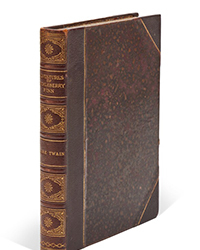
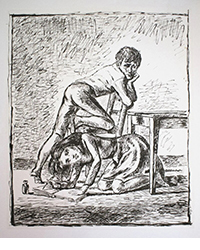
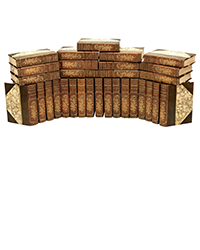
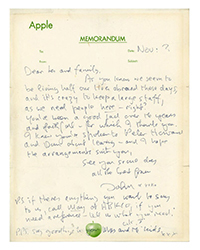
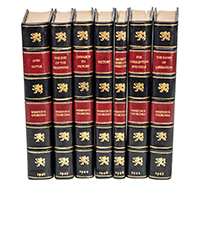
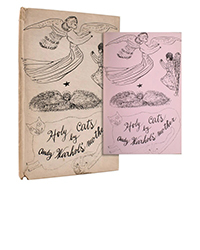
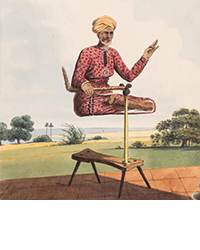
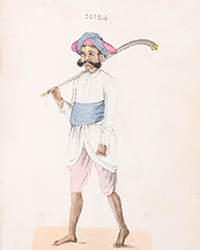
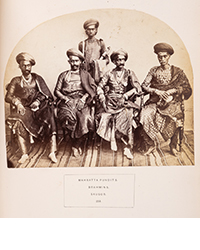
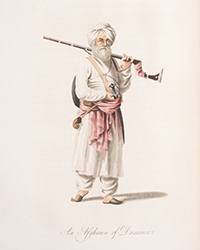
![Forum, Feb. 19: Lot 57[Album and Treatise on Hinduism], manuscript treatise on Hinduism in French, 31 watercolours of Hindu deities, Pondicherry, 1865. £3,000-4,000 Forum, Feb. 19: Lot 57[Album and Treatise on Hinduism], manuscript treatise on Hinduism in French, 31 watercolours of Hindu deities, Pondicherry, 1865. £3,000-4,000](https://ae-files.s3.amazonaws.com/AdvertisementPhotos/f70b3790-9b4a-4990-b402-f0322021c0de.jpg)
![Forum, Feb. 19: Lot 62 Allan (Capt. Alexander). Views in the Mysore Country,
[1794]. £2,000-3,000 Forum, Feb. 19: Lot 62 Allan (Capt. Alexander). Views in the Mysore Country,
[1794]. £2,000-3,000](https://ae-files.s3.amazonaws.com/AdvertisementPhotos/ad2cf7b4-4d93-4231-a956-b440583b39b3.jpg)
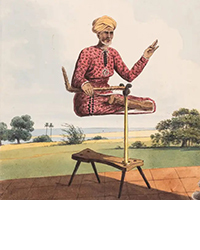
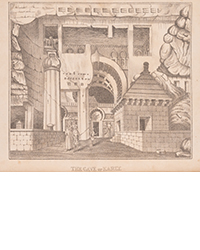
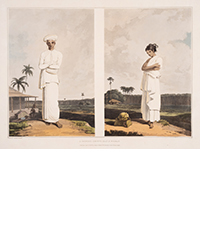
![Forum, Feb. 19: Lot 123D'Oyly (Charles). Behar Amateur Lithographic Scrap Book, lithographed throughout with title and 55 plates mounted on 43 paper leaves, [Patna], [1828]. £3,000-5,000 Forum, Feb. 19: Lot 123D'Oyly (Charles). Behar Amateur Lithographic Scrap Book, lithographed throughout with title and 55 plates mounted on 43 paper leaves, [Patna], [1828]. £3,000-5,000](https://ae-files.s3.amazonaws.com/AdvertisementPhotos/5651043b-3c0d-4e2c-931f-72133bda9b36.jpg)
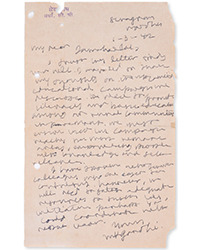
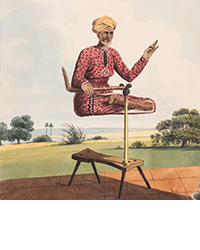
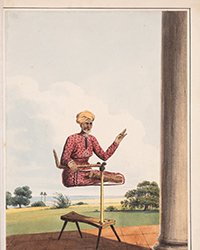
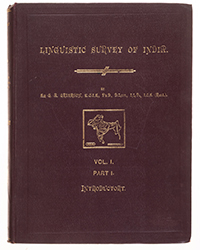
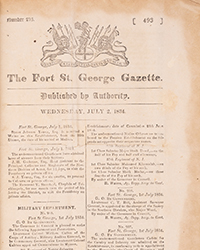
![Forum, Feb. 19: Lot 205Marshall (Sir John) and Alfred Foucher. The Monuments of Sanchi, 3 vol., first edition, 141 plates, most photogravure, [Calcutta], [1940]. £3,000-4,000 Forum, Feb. 19: Lot 205Marshall (Sir John) and Alfred Foucher. The Monuments of Sanchi, 3 vol., first edition, 141 plates, most photogravure, [Calcutta], [1940]. £3,000-4,000](https://ae-files.s3.amazonaws.com/AdvertisementPhotos/8c8244b7-4573-44d3-9c70-e0d3a3ed3cc4.jpg)
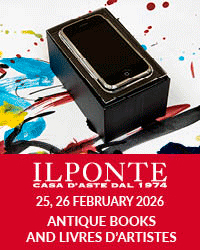
![Il Ponte, Feb. 25-26: HAMILTON, Sir William (1730-1803) - Campi Phlegraei. Napoli: [Pietro Fabris], 1776, 1779. € 30.000 - 50.000 Il Ponte, Feb. 25-26: HAMILTON, Sir William (1730-1803) - Campi Phlegraei. Napoli: [Pietro Fabris], 1776, 1779. € 30.000 - 50.000](https://ae-files.s3.amazonaws.com/AdvertisementPhotos/0372eeb9-97e1-47b2-baca-b3287d4704ee.jpg)
![Il Ponte, Feb. 25-26: [MORTIER] - BLAEU, Joannes (1596-1673) - Het Nieuw Stede Boek van Italie. Amsterdam: Pieter Mortier, 1704-1705. € 15.000 - 25.000 Il Ponte, Feb. 25-26: [MORTIER] - BLAEU, Joannes (1596-1673) - Het Nieuw Stede Boek van Italie. Amsterdam: Pieter Mortier, 1704-1705. € 15.000 - 25.000](https://ae-files.s3.amazonaws.com/AdvertisementPhotos/8f9ce440-b420-4407-8293-eb8e1b38ca19.jpg)
![Il Ponte, Feb. 25-26: TULLIO D'ALBISOLA (1899-1971) - Bruno MUNARI (1907-1998) - L'Anguria lirica (lungo poema passionale). Roma e Savona: Edizioni Futuriste di Poesia, senza data [ma 1933?]. € 20.000 - 30.000 Il Ponte, Feb. 25-26: TULLIO D'ALBISOLA (1899-1971) - Bruno MUNARI (1907-1998) - L'Anguria lirica (lungo poema passionale). Roma e Savona: Edizioni Futuriste di Poesia, senza data [ma 1933?]. € 20.000 - 30.000](https://ae-files.s3.amazonaws.com/AdvertisementPhotos/71bb9667-5d66-4aa8-96a2-9880c74a7a26.jpg)
